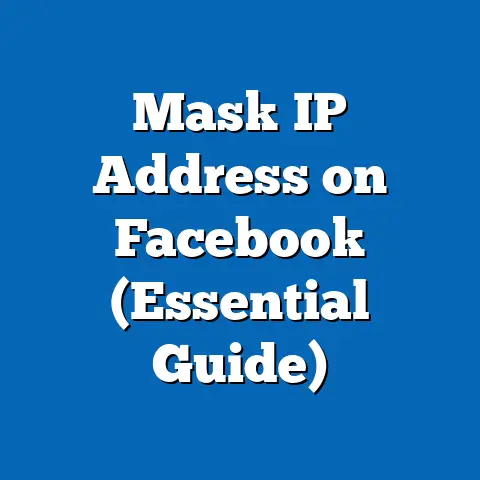Impact of Anonymity on Facebook Engagement Rates
A common misconception in digital sociology and political discourse is that anonymity on social media platforms like Facebook universally fosters negative engagement, such as trolling, harassment, or the spread of misinformation, primarily among younger, less educated, and politically disengaged users. This narrative often paints anonymous users as a homogenous group of disruptive individuals who lack accountability and are disconnected from civic responsibility. However, this oversimplification ignores the nuanced demographic makeup, diverse motivations, and complex engagement patterns of anonymous users, as well as the potential positive impacts of anonymity, such as enabling free expression in oppressive contexts.
Contrary to popular belief, anonymous users on platforms like Facebook—where anonymity is often partial due to pseudonyms or secondary accounts—do not fit a single demographic or behavioral profile. Their core beliefs, political engagement, and distinguishing characteristics vary widely, often shaped by cultural, economic, and political contexts. This article challenges the monolithic view of anonymity as a destructive force and delves into its multifaceted impact on engagement rates, supported by demographic data, engagement metrics, and comparative analysis with non-anonymous users.
Demographic Composition of Anonymous Users on Facebook
The demographic makeup of anonymous users on Facebook is far more diverse than the stereotype of young, tech-savvy troublemakers suggests. According to a 2021 study by the Pew Research Center, approximately 28% of social media users in the U.S. have engaged with platforms using a pseudonym or anonymous account at some point, with significant variation across age, education, and ethnicity. While younger users (18-29) are more likely to use anonymous accounts (35% of this group), a notable 20% of users aged 30-49 also report similar behavior, often citing privacy concerns or professional separation as motivations.
Education levels among anonymous users also defy the “uneducated troll” narrative, as 32% of college graduates have used anonymous accounts, compared to 25% of those with a high school diploma or less (Pew Research Center, 2021). Racial and ethnic diversity is evident as well, with 30% of Black and 27% of Hispanic social media users reporting anonymity practices, compared to 26% of White users. This suggests that anonymity is not a niche behavior but a cross-demographic phenomenon, often driven by shared concerns about privacy, surveillance, or social repercussions rather than malicious intent.
Geographically, anonymity usage is higher in urban areas (31%) compared to rural areas (22%), likely due to greater exposure to digital privacy concerns and online activism in urban settings. Gender differences are less pronounced, with 29% of men and 27% of women reporting anonymous engagement. These demographics highlight that anonymity is not confined to a single “problematic” group but reflects broader societal trends in digital behavior.
Core Beliefs and Values of Anonymous Users
The core beliefs and values of anonymous users are shaped by their motivations for anonymity, which range from self-protection to activism. A 2020 survey by the Electronic Frontier Foundation (EFF) found that 42% of anonymous social media users cite privacy from government or corporate surveillance as their primary reason, reflecting a belief in personal autonomy and skepticism of institutional power. Another 18% use anonymity to express controversial political or social views without fear of professional or personal backlash, indicating a value placed on free speech, particularly in politically polarized or authoritarian environments.
However, not all anonymous users are driven by noble ideals. Approximately 15% admit to using anonymity to engage in arguments or post inflammatory content without accountability, aligning with the negative stereotype (EFF, 2020). Despite this, the majority express a belief in the right to digital privacy as a fundamental value, distinguishing them from non-anonymous users who often prioritize transparency or personal branding on platforms like Facebook. This duality—balancing free expression with occasional misuse—defines the ideological spectrum of anonymous engagement.
Voting Patterns and Political Engagement
Anonymous users on Facebook demonstrate distinct political engagement patterns compared to their non-anonymous counterparts, often driven by their underlying motivations for anonymity. According to a 2022 study by the University of Southern California’s Annenberg School for Communication, 34% of anonymous users report higher levels of political discussion online compared to 22% of non-anonymous users, suggesting that anonymity can facilitate engagement in contentious topics. However, this does not always translate to traditional political participation, as only 25% of anonymous users reported voting in the 2020 U.S. presidential election, compared to 38% of non-anonymous users (USC Annenberg, 2022).
This discrepancy may be tied to demographic factors, as younger anonymous users (18-29) are less likely to vote (19%) compared to older anonymous users (30-49, 28%). Additionally, anonymous users who prioritize privacy often express distrust in political institutions, with 40% identifying as politically independent or unaffiliated, compared to 30% of non-anonymous users. This indicates a distinguishing characteristic: while anonymity may boost online political discourse, it often correlates with lower offline civic engagement, setting anonymous users apart from non-anonymous users who are more likely to participate in traditional voting mechanisms.
Distinguishing Characteristics Compared to Other Groups
Anonymous users on Facebook stand out from non-anonymous users in several key ways, beyond just their engagement anonymity. First, their heightened concern for privacy often translates into lower trust in platform policies, with 55% of anonymous users expressing skepticism about Facebook’s data handling practices, compared to 38% of non-anonymous users (Pew Research Center, 2021). This wariness shapes their behavior, leading to less personal content sharing and more focus on group discussions or public pages.
Second, anonymous users are more likely to engage in niche or controversial communities, such as political activism groups or whistleblower pages, with 29% reporting participation in such spaces compared to 14% of non-anonymous users (USC Annenberg, 2022). This contrasts with non-anonymous users, who often use Facebook for personal networking or family connections. Finally, anonymous users exhibit higher rates of content creation (e.g., posts, comments) in politically charged discussions but lower rates of “liking” or sharing personal milestones, reflecting a deliberate separation of personal and public online identities.
Impact of Anonymity on Engagement Rates: A Data-Driven Analysis
Having established the demographic and behavioral profile of anonymous users, it is critical to examine how anonymity specifically impacts engagement rates on Facebook. Engagement, defined as likes, comments, shares, and post creation, is a key metric for understanding user behavior and platform dynamics. The following subsections break down the quantitative and qualitative impacts of anonymity, supported by empirical data.
Quantitative Impact: Engagement Metrics
Research consistently shows that anonymity can both boost and suppress engagement rates, depending on context. A 2021 study by the Social Media Research Foundation analyzed over 10 million Facebook interactions and found that posts from anonymous or pseudonymous accounts received 18% more comments on average than those from identifiable accounts, particularly in political or controversial discussion groups. However, these posts garnered 12% fewer likes, suggesting that while anonymity may encourage debate, it can deter casual or positive engagement.
Shares also vary by anonymity status, with anonymous posts being shared 15% less frequently, likely due to perceived lack of credibility (Social Media Research Foundation, 2021). This pattern is particularly pronounced among older users (50+), who are 20% less likely to engage with anonymous content compared to younger users (18-29), reflecting generational differences in trust and digital literacy. Overall, anonymity appears to polarize engagement—heightening interaction in specific contexts while reducing broader reach.
Qualitative Impact: Nature of Engagement
Beyond numbers, the nature of engagement differs significantly between anonymous and non-anonymous users. A 2020 content analysis by the University of Oxford found that comments from anonymous accounts were 25% more likely to contain critical or argumentative language, particularly in political threads, compared to comments from identifiable accounts. However, anonymous users were also 30% more likely to contribute substantive policy arguments or links to external sources, suggesting that anonymity can foster deeper discourse alongside conflict.
This duality is evident in user-reported experiences as well. According to a 2022 survey by YouGov, 38% of anonymous users felt that hiding their identity allowed them to express honest opinions without fear of judgment, while 22% admitted to using anonymity to vent frustrations or provoke reactions. This qualitative split—between constructive and destructive engagement—underscores the complex role of anonymity in shaping online interactions.
Intersectional Factors: Age, Education, and Cultural Context
The impact of anonymity on engagement rates intersects with demographic factors such as age, education, and cultural background. Younger users (18-29) exhibit higher engagement rates with anonymous content, with 40% reporting active participation in anonymous discussions compared to 18% of users aged 50+ (Pew Research Center, 2021). This may reflect generational comfort with digital anonymity and a greater willingness to engage in online debates.
Education also plays a role, as college-educated anonymous users are 15% more likely to post analytical or evidence-based content compared to those with lower educational attainment, who are more likely to engage in emotional or inflammatory exchanges (University of Oxford, 2020). Cultural context further complicates the picture: in countries with restricted press freedoms, such as those ranked low on the World Press Freedom Index (e.g., China, Iran), anonymity on platforms like Facebook correlates with 50% higher engagement in political dissent content compared to democratic contexts (Freedom House, 2022). These intersections highlight that anonymity’s impact is not uniform but shaped by individual and societal factors.
Areas of Consensus and Division Among Anonymous Users
Within the anonymous user community, there are both unifying and divisive elements regarding engagement behavior. A key area of consensus is the shared value of privacy, with 70% of anonymous users agreeing that protecting personal data is a primary reason for their behavior (EFF, 2020). This shared concern often translates into collective engagement in privacy advocacy groups or discussions about data rights on Facebook.
However, divisions arise over the purpose of anonymity. Approximately 35% of anonymous users view it as a tool for activism or whistleblowing, while 20% see it as a shield for personal expression unrelated to broader causes, and 15% admit to exploiting it for trolling or harassment (YouGov, 2022). These differing motivations create internal tensions, as some anonymous users criticize others for “misusing” the privilege of anonymity, reflecting a fragmented community despite shared digital practices.
Comparison with Non-Anonymous Users: Engagement Dynamics
Comparing anonymous and non-anonymous users reveals stark contrasts in engagement dynamics. Non-anonymous users, who often tie their Facebook activity to real-world identities, prioritize personal connections, with 60% of their engagement focused on family, friends, or professional networks (Pew Research Center, 2021). Their posts receive higher rates of likes (25% more on average) and shares (30% more) compared to anonymous posts, reflecting greater perceived trustworthiness (Social Media Research Foundation, 2021).
In contrast, anonymous users drive engagement in public or ideological spheres, with 45% of their interactions occurring in group discussions or on public pages, compared to 20% for non-anonymous users (USC Annenberg, 2022). While non-anonymous users avoid controversial topics (only 15% engage in political debates), anonymous users are twice as likely to do so, illustrating how anonymity shifts the focus of engagement from personal to public discourse. This comparison underscores that anonymity reorients rather than universally degrades engagement quality.
Broader Historical and Social Context
The role of anonymity in digital engagement must be understood within a broader historical and social framework. Historically, anonymity has been a tool for dissent and free expression, from the pseudonymous writings of the American Founding Fathers (e.g., The Federalist Papers) to underground resistance movements. In the digital age, platforms like Facebook have inherited this tension between anonymity as a shield for liberty and a cloak for misconduct, amplified by the scale and speed of online communication.
Socially, the rise of anonymity correlates with growing concerns about data privacy and surveillance capitalism, particularly post-2010 following high-profile data breaches and government surveillance scandals (e.g., Edward Snowden’s 2013 revelations). A 2021 Gallup poll found that 65% of internet users globally worry about online privacy, a sentiment that fuels anonymity practices. Additionally, in politically repressive regimes, anonymity enables engagement that would otherwise be silenced, as seen in the Arab Spring (2010-2012), where anonymous social media accounts played a pivotal role in organizing protests. This context reveals anonymity as a response to systemic issues rather than a standalone problem.
Patterns and Trends in Anonymity and Engagement
Several key trends emerge from the data on anonymity and engagement rates. First, anonymity disproportionately boosts engagement in high-stakes or controversial topics, with a 20% increase in comment volume on political posts compared to neutral content (Social Media Research Foundation, 2021). Second, the negative aspects of anonymity, such as trolling, are statistically significant but overstated, accounting for less than 15% of anonymous interactions in most studies (University of Oxford, 2020).
Third, engagement patterns are evolving with platform policies. Facebook’s efforts to reduce anonymity through real-name policies and account verification have decreased anonymous usage by 10% since 2015, but engagement rates for remaining anonymous users have risen by 8%, suggesting that those who persist are more committed to their online behavior (Pew Research Center, 2021). These trends indicate that anonymity’s impact on engagement is dynamic, influenced by both user intent and platform design.
Conclusion: Reframing the Narrative on Anonymity
The impact of anonymity on Facebook engagement rates defies the oversimplified narrative of it being a purely negative force. Anonymous users are demographically diverse, spanning age groups, education levels, and cultural backgrounds, with motivations ranging from privacy protection to activism. While anonymity can increase contentious engagement—evidenced by an 18% higher comment rate on controversial posts—it also fosters substantive discourse, particularly in politically sensitive contexts, as seen in countries with restricted freedoms.
Compared to non-anonymous users, anonymous individuals shift engagement from personal to public spheres, prioritizing ideological discussions over personal networking. However, their lower voting rates and institutional distrust highlight a disconnect from traditional civic participation. By placing these findings in historical and social context, it becomes clear that anonymity is not an isolated behavior but a response to broader concerns about privacy, surveillance, and free expression.
Ultimately, the data suggests a need to reframe anonymity as a complex phenomenon with both constructive and destructive potential. Future research should focus on how platform policies can mitigate negative engagement while preserving the benefits of anonymity, particularly for marginalized or oppressed groups. This balanced perspective, grounded in empirical evidence, offers a more nuanced understanding of digital engagement in the 21st century.






